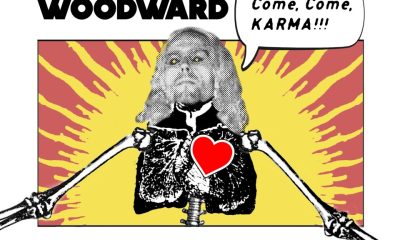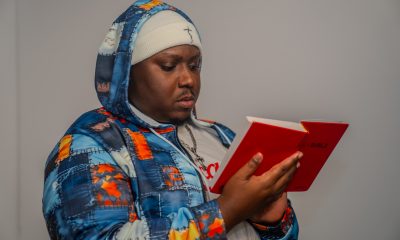Music
King Von’s Untimely Death Is Another Call For Radical Change
Getty Image The beloved storyteller wasn’t just creating a product to fetishize, he offered a portrait of a society that needs examining. …


Chicago artist King Von died last Friday at just 26 years old. The rising rapper, born Dayvon Bennett, was involved in a deadly altercation outside an Atlanta hookah lounge where he and his two friends, Oblock Louie and Slutty OTF, were shot and killed. A 22-year-old Timothy Leeks was arrested and charged for Von’s murder, while there’s rampant speculation that Atlanta police shot Von’s friends.
Von grew up around the Parkway Gardens apartment complex that Chief Keef (and later Von himself) memorialized as “O-Block” in honor of the late Odee Perry, who was murdered in 2011. Von was gaining visibility as one of hip-hop’s best storytellers with songs like “Took Her To The O” and the “Crazy Story” series. A natural narrator, he rhymed with a bouncy flow that swayed like a hypnotist’s stopwatch, entrancing listeners in his stories. But now, he’s yet another seismic crater for a subgenre that loses so many of its biggest stars to jail or death.
Along with Polo G, Von was a leading figure of a long-delayed second generation of Chicago drill. But Von actually grew up with Keef, his close friend (and OTF label boss) Lil Durk, and other drill rap pioneers. He didn’t get to pursue rap until 2017, when he came home after fighting a murder charge as well as two attempted murder charges stemming from a May 2014 shooting. The charges were dropped, giving Von a second chance, and he took advantage. At the time of his death, he and Durk were fighting a case after an alleged July 2019 shooting and robbery incident, but he was still going full steam ahead musically, recently releasing his Welcome To O-Block album.
For Von, art reflected reality to a higher degree than with most rappers. After his death, a clip re-emerged of Durk telling him to stop mentioning dead rivals in his songs because “that sh*t be hurtin ‘em, for real.” There’s real pain, and real loss, behind the decades-long Chicago gang conflict. While kids are dying, fans on Reddit and YouTube have the privilege to spectate the violence as mere entertainment on pages tabulating “bodies, attempted bodies, and people clapped at” stats.
Von and Durk had a longstanding rivalry with late Chicago rapper FBG Duck, who was killed in August. Duck was from 63rd street and St. Lawrence in Chicago, an area that Von frequently dissed in songs. Von’s fans often made “not from 63rd” jokes on social media unaware, or apathetic, to the gravity of the fracture. Von had two children. Duck had four. All of them will be growing up without their fathers. But what part does each of us play in creating a better world for their children? Perhaps Duck and Von’s deaths, and the speculation that Von’s was derived from petty rap beef, will be an eye-opener for rap fans and “media personalities” all complicit in toxic flame-fanning.
Von had recalled that he and his peers went to high school with Duck and his peers. In a better-resourced community, they could have seen the benefits of unity and become the crux of a rap scene rivaling Atlanta’s. But because Chicago, like so many other areas, suffers from civic negligence that breeds poverty and hypermasculinity, they grew up on opposite “sides” and became rivals. This circumstance is a national tragedy that should register the same disdain at the American status quo as police brutality and other injustices — because they’re all branches of the same tree of systemic racism.
Before full details of Von’s death were revealed, early social media murmurs speculated that Von was fatally shot by the same cops who killed his friends. People immediately took to social media to call out the police system for once again killing an unarmed Black person. But once it was alleged that Von was killed during a fight by a young Black male instead of cops, the indictment of the establishment shifted to platitudes like, “watch how you move,” mind the “power of the tongue,” and “stay out the way.” But is America’s devaluation of Black life not what is in “the way” of our survival? There’s no hiding from anti-Blackness.
Black America rightfully centers systemic accountability in the police brutality discussion, but so often our rhetoric about intra-communal gun violence scrutinizes individual or communal accountability. Imagine someone saying that a victim of police brutality should have “moved better.” That doesn’t strike at the root of the issue. Black activists who catch snide “I thought Black lives mattered” ire after gun violence are already working for change via challenging white supremacy. But there are a notable amount of Black people who view gang violence as less deserving of advocacy than brutality victims even though it’s all state-sanctioned violence.
In the past three years alone artists like Von, Duck, Nipsey Hussle, XXXTentacion, Pop Smoke, Jimmy Wopo, Lil Marlo, and Huey, among too many others, were fatally shot. They were from different areas, living different lives, but all fell prey to the machinations of a country that often exploits and benefits from Black death. America depends on systemic inequality, and violence is a manifestation of poverty. Every billionaire’s material excess has to be juxtaposed against the excess toll of Black lives lost to the brutal conditioning of survival mode. Even when artists like Von “make it” they can’t easily shake such a traumatized mentality. Judging from ominous Von lines like “if I should die, I’m boostin’ the murder rate” from the recently released “I Am What I Am,” he, like so many artists, saw premature death as an inevitability. That brand of fatalism represents a purposeful failing by the system.
Victim blamers can say what they want about his diss records, and at-times antagonistic social media presence, but the inarguable reality is that no matter his individual conduct, he would still be living in a dangerous world. Solving this problem isn’t about “moving right,” it’s about the social movement against systemic oppression. In so many cities and towns, the communal chasm may be too deep to heal this generation’s ill-will toward each other. But if people are given opportunities, they will by and large prioritize their personal growth over risking their freedom and lives for violence. And from there, the hope is that things will only improve over the next generations. That starts with a push for radical change. Economic deprivation, school-to-prison pipelines, predatory police, and for-profit prisons all have to go. Everyone deserves access to public resources that will offer them a productive life. As things are now, too many people start out in disadvantaged areas and have to navigate life on a wayward journey.
So many music consumers are comfortable experiencing the Black struggle as mere entertainment. That’s a reflection of America’s overall disregard for Black lives. It was hip-hop’s expansion into white suburbia that inspired the genre’s commercial boom; vicarious curiosity sparked the industrialization and mass consumption of our trauma. But Von wasn’t just creating a product to fetishize, he offered a portrait of a society that needs examining. It would be a fitting tribute to his gift, like that of many other artists, that listeners hear their stories and ponder how they can play a part in dismantling the social factors that force so many talented young people to live and create in survival mode.
Artist Spotlight
Mamas Gun and Brian Jackson shines light on the truth on latest release “DIG!”

Mamas Gun makes a strong comeback with their new single “DIG!.” The track sounds more like a strong statement of intent than just a release. The UK band is known for its smooth blend of blue-eyed soul and traditional black music. They show once again that they can make music that sounds both thoughtful and very new, while still being real, emotional, and sophisticated.
“DIG!” was recorded directly onto analogue tape, and every note has warmth, grit, and soul. The production choice gives the music a rich, natural sound that complements the band’s unique groove. It is a piece of music that makes people slow down, really listen, and experience it rather than hear it.
Adding famous collaborator Brian Jackson, whose vocals, keyboard, and flute give the song a timeless elegance, adds even more depth and magic. Jackson is known for working with artists such as Stevie Wonder, Gil Scott-Heron, Roy Ayers, and Earth, Wind & Fire. His addition makes the song something truly special. His reunion with Andy Platts, the lead singer of Mamas Gun, almost twenty years after they first worked together creatively in New York, gives “DIG!” a very personal touch that can be felt throughout. “DIG!” sets a strong mood based on connection, art, and essence. Mamas Gun not only goes back to their roots but also makes them stronger. This song is heartfelt, timeless, and completely captivating.
Connect with Mamas Gun on Spotify || Instagram || facebook || Youtube
Artist Spotlight
Bromsen crafts a suspension between attachment and release in new single “Concendrain”

Bromsen’s latest release, “Concendrain,” is very immersive and lives in the space between control and disintegration. The song smoothly shifts from focused to tired, from connected to free, and captures a complex emotional balance that is both personal and universal.
“Concendrain” starts slowly and carefully, the structure has layers that change over time, so each part can come out on its own without any stress or hurry. As time goes on, electronic textures begin to emerge, giving the music a mood that eventually turns into rock-infused energy. These different sounds don’t clash, they work together to create a track that is alive, fluid, and always changing.
The guitar, voice, and rhythm should all work together on the song. These parts don’t compete for attention; instead, they work together to make a smooth flow that pulls the listener into the song’s emotional depth. The arrangement features vocals that complement complex guitar lines and a steady beat that keeps everything in line.
“Concendrain” is really interesting because it has two sides. The track is about the fight in your head between giving up and pushing through, and between staying focused and giving in to tiredness. Bromsen and Reatsch work together to make something that looks natural and well-made. “Concendrain” doesn’t try to be cool or follow trends. Instead, it gives you a slow experience that you should really pay attention to. “Concendrain” is a powerful and thought-provoking work that sticks with you long after the last note has faded away. It stands out because its structure changes, its atmosphere is rich, and its emotions are strong.
-

 Artist Spotlight5 days ago
Artist Spotlight5 days agoGOODTWIN shares reflection with indie-pop single, “Soak It Up”
-

 Artist Spotlight3 days ago
Artist Spotlight3 days agoSAMSARA transforms quiet heartbreak into a modern rock journey on latest release “mrs. porter”
-

 Artist Spotlight3 days ago
Artist Spotlight3 days agoTom Woodward exposes the dark side of modern idol worship in latest release “PHONEY MESSIAH”
-

 Artist Spotlight3 days ago
Artist Spotlight3 days agoMORPHEUS VON DOBENHAUSEN lets go of the chaos, dancing steady soft and slow in latest release “GOODBYE CHAOS”
-

 Artist Spotlight3 days ago
Artist Spotlight3 days agoSavvie steps out with an anthem of power and perseverance on latest release “Incredible”
-

 Artist Spotlight3 days ago
Artist Spotlight3 days agoSkillMusicsa speaks in silence when love fades with latest release “How Could You”
-

 Artist Spotlight3 days ago
Artist Spotlight3 days agoMarcello Cordova turns loss into light on latest release “Jan 3rd (I Wish We Would Have Had More Time)”
-

 Artist Spotlight23 hours ago
Artist Spotlight23 hours agoPaul Hodes and The Blue Buddha Band hit the open road with soulful americana in latest release “The Heartland”

